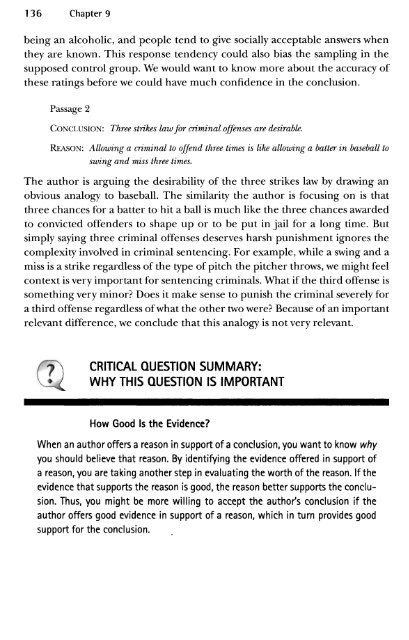Asking the Right Questions, A Guide to Critical Thinking, 8th Ed
Asking the Right Questions, A Guide to Critical Thinking, 8th Ed
Asking the Right Questions, A Guide to Critical Thinking, 8th Ed
Create successful ePaper yourself
Turn your PDF publications into a flip-book with our unique Google optimized e-Paper software.
136 Chapter 9<br />
being an alcoholic, and people tend <strong>to</strong> give socially acceptable answers when<br />
<strong>the</strong>y are known. This response tendency could also bias <strong>the</strong> sampling in <strong>the</strong><br />
supposed control group. We would want <strong>to</strong> know more about <strong>the</strong> accuracy of<br />
<strong>the</strong>se ratings before we could have much confidence in <strong>the</strong> conclusion.<br />
Passage 2<br />
CONCLUSION: Three strikes law for criminal offenses are desirable.<br />
REASON: Allowing a criminal <strong>to</strong> offend three times is like allowing a batter in baseball <strong>to</strong><br />
swing and miss three times.<br />
The author is arguing <strong>the</strong> desirability of <strong>the</strong> three strikes law by drawing an<br />
obvious analogy <strong>to</strong> baseball. The similarity <strong>the</strong> author is focusing on is that<br />
three chances for a batter <strong>to</strong> hit a ball is much like <strong>the</strong> three chances awarded<br />
<strong>to</strong> convicted offenders <strong>to</strong> shape up or <strong>to</strong> be put in jail for a long time. But<br />
simply saying three criminal offenses deserves harsh punishment ignores <strong>the</strong><br />
complexity involved in criminal sentencing. For example, while a swing and a<br />
miss is a strike regardless of <strong>the</strong> type of pitch <strong>the</strong> pitcher throws, we might feel<br />
context is very important for sentencing criminals. What if <strong>the</strong> third offense is<br />
something very minor? Does it make sense <strong>to</strong> punish <strong>the</strong> criminal severely for<br />
a third offense regardless of what <strong>the</strong> o<strong>the</strong>r two were? Because of an important<br />
relevant difference, we conclude that this analogy is not very relevant.<br />
ff\<br />
V ^<br />
CRITICAL QUESTION SUMMARY:<br />
WHY THIS QUESTION IS IMPORTANT<br />
How Good Is <strong>the</strong> Evidence?<br />
When an author offers a reason in support of a conclusion, you want <strong>to</strong> know why<br />
you should believe that reason. By identifying <strong>the</strong> evidence offered in support of<br />
a reason, you are taking ano<strong>the</strong>r step in evaluating <strong>the</strong> worth of <strong>the</strong> reason. If <strong>the</strong><br />
evidence that supports <strong>the</strong> reason is good, <strong>the</strong> reason better supports <strong>the</strong> conclusion.<br />
Thus, you might be more willing <strong>to</strong> accept <strong>the</strong> author's conclusion if <strong>the</strong><br />
author offers good evidence in support of a reason, which in turn provides good<br />
support for <strong>the</strong> conclusion.



